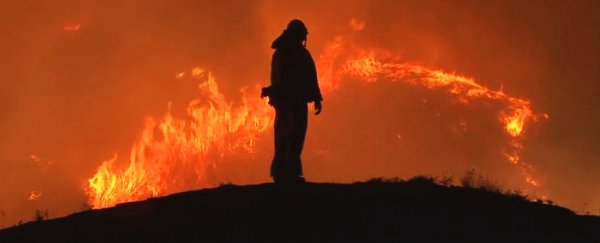Scientists at the US Geological Survey must now submit their presentation titles for review by the Interior Department to get approval to attend two major conferences, and they will have to identify how their research relates to Interior Secretary Ryan Zinke's priorities.
In guidelines posted on the agency's internal website this week and obtained by The Washington Post, the USGS's Office of Administration told employees they will have to provide a detailed "attendee justification" when applying for travel approval for the annual meetings of the American Geophysical Union in Washington and the Geological Society of America in Indianapolis later this year.
Interior spokeswoman Faith Vander Voort said Thursday that budget limitations mean the department "can only afford to send people who have a meaningful role at the conference… If taxpayer dollars are being spent to send someone to a conference, we'd like some degree of confidence that their attendance will advance the department's priorities."
Zinke has detailed 10 priorities since joining the Trump administration in March 2017, including "create a conservation stewardship legacy second only to Teddy Roosevelt," "sustainably develop our energy and natural resources," "protect our people and the border" and "strike a regulatory balance."
But Chip Groat, who served as USGS director under presidents Bill Clinton and George W. Bush, called the new protocol unusual and "inappropriate."
"Someone from another part of Interior might not understand the fine points of why this science is important," he said Wednesday.
"They're making some judgment about the type and quality of science the USGS is presenting."
Bruce Babbitt, interior secretary during the Clinton administration, used stronger language: "It's a form of censorship."
Conference attendance by federal employees has been under scrutiny since 2012, when it was revealed that the General Services Administration spent $823,000 on a Las Vegas conference that featured a mind reader and a $31,208 reception.
In recent years, USGS employees have had to apply for travel approval through an online database. If overall attendance at a conference were going to cost more than $100,000 - as that for AGU and GSA usually does - the agency then submitted the requests to the Interior Department.
Those requests were ranked by USGS, with priority given to staff receiving awards, people who were officers of the society sponsoring the meeting, and session and committee chairs.
Marcia McNutt, who was USGS director under President Barack Obama, said this week that political appointees were never involved in the prioritization process.
Vander Voort said the travel applications would be evaluated by Assistant Secretary for Water and Science Tim Petty, whom President Trump appointed in the fall to oversee the USGS and Bureau of Reclamation.
In the fall, the Interior Department put a new cap on attendance at the annual AGU meeting: No more than 199 employees across the department could travel for the conference, and total expenditures could not exceed $399,000.
Approvals for attendance came only weeks before the conference was slated to start. As a result, just 178 USGS staffers were at the massive meeting in New Orleans - less than half the number who usually participate.
Thirty abstracts for posters or oral presentations, which take weeks to prepare, were withdrawn by USGS scientists unable to attend.
This year there will be "no rigid cap" on attendance, Vander Voort said, "but in general, the more expensive the conference, the higher the level of scrutiny inside the department budget offices."
In the guidance to USGS staff posted this week, the Office of Administration said it had "learned a lot over these recent years about preparing conference attendance packages for approval by DOI."
The message acknowledged that many researchers might not know the final title for their presentations or what sessions they'd be attending. Registration deadlines for both meetings aren't until the fall.
2018 © The Washington Post
This article was originally published by The Washington Post.
